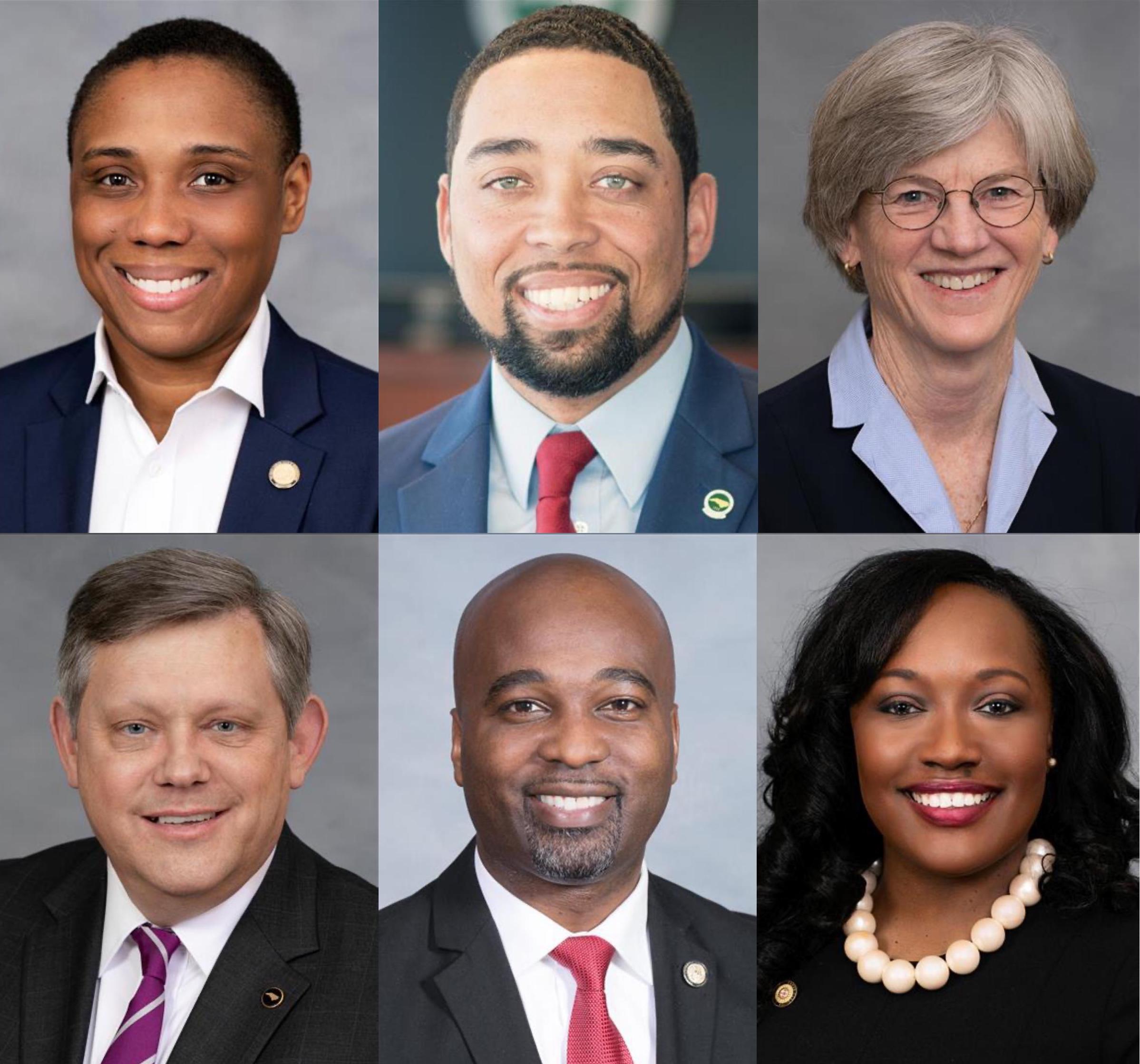When the six Democratic legislators representing Durham County — two senators and four representatives — head to work in a Republican-controlled legislature, they have to decide how to balance a distinctive constituency with the realities of Raleigh.
“It’s a delicate dance,” said Sen. Natalie Murdock. “What I remind my colleagues is that progressive ideals are everywhere.”
A blot of deep blue in a sea of red, Durham County is known nationally and statewide as a safe district for Democrats. The city’s politics are even more mismatched from the state capital, with policies that serve as models for progressive priorities across the country, like budgeting through direct democracy, reparations in Black neighborhoods, and bold climate goals.
But turning ideals into laws is a persistent challenge, Sen. Murdock and her colleagues concede. During the legislature’s last long session in 2021, North Carolina Democrats used up much of their stamina blocking controversial voting legislation, compromising on education spending, and participating in a standoff over the state budget.
Neither the midterm elections nor national trends in politics suggest 2023 will go any more smoothly. In past sessions, Democratic Governor Roy Cooper vetoed many Republican-sponsored bills. But North Carolina Democrats lost ground in the legislature in November’s elections, losing two seats in each chamber. They dropped from 22 to 20 in the 50-member Senate and 51 to 49 in the 120-member House, leaving Republicans with a three-fifths supermajority in the Senate and one seat shy of the supermajority in the House. A supermajority in both chambers would give Republicans the ability to override Governor Cooper’s veto without any support from Democrats.
“In my three years as a legislator, I’ve seen the difference in the numbers. And it makes a huge difference when you fall below that threshold,” said Murdock. Which Democrats could break with the party, Murdock said, will depend on the topic being discussed.
Some issues appear safer. In Durham and across the state, the Democrats so far are united on protecting access to an abortion, with every member in the legislature signing onto bills to codify the provisions of Roe v. Wade. All six delegates mentioned reproductive rights as a priority this session, although none know exactly what Republicans plan on proposing.
“That is the million-dollar question,” said Murdock. “My stance is any ban will be too extreme. We’re already at 20 weeks. We already know that patients are coming as far as Texas to get care, and we already have a backlog of some.”
The legislators said they’ve heard anything from a six-week to a 13-week ban floating around, but they haven’t seen a plan in writing.
The issue of abortion rights is not the only countrywide controversy on their radar. They are already seeing so-called GOP “culture war bills” on critical race theory and LGBT topics in schools.
“Any national thing that’s happening in GOP-controlled states is going to find its way here,” said Rep. Zack Hawkins.
Rep. Hawkins doesn’t believe these bills make sense in North Carolina. “Just because everybody else is jumping off a cliff doesn’t mean we have to as well,” he said. “You can leave things that are national conservative or GOP political dreams for other states to do, because that’s just not who we are. I hope that perspective wins out at the end of the day.”
Though, some hot-button issues have found an undeniable home here — particularly voting rights and gerrymandering. Durham’s legislators repeatedly mentioned their desire to draw fair election maps. The North Carolina Supreme Court has ordered the legislature to redraw the congressional and state senate districts. The Republicans will have full control over this process, since redistricting isn’t subject to the governor’s veto.
Relatedly, bills on election matters like mail-in voting and voter ID are top of mind for many North Carolina Democrats. Unlike most legislation, which needs to be in by a specific deadline, elections-related bills can be filed at any time during the long session, leaving legislators constantly on their toes. In 2021, the Democrats were unified against GOP efforts surrounding the ballot box, and the Republicans didn’t have the numbers to override vetoes.
But Democrats’ weakened position this session makes a repeat of that success less likely, prompting Durham’s legislators to think about defensive strategies beyond voting nay.
Sen. Mike Woodard went behind the scenes, discussing the ways he approaches Republican senators in committees and how he gives an effective floor speech, even on a bill he knows might not go his way.
For topics that have seeped in from the national stage, he offered this advice: “Bring the issues home. Localize it to your state. I always make the argument that we should look at what North Carolina’s challenges are.”
Sen. Murdock said she keeps track of states with earlier sessions or filing deadlines. She’s been looking at Florida to monitor GOP bills that could be coming to North Carolina.
Playing good defense, to the legislators, is not all combat. It can also be camaraderie with Republican colleagues. “When you get to know people, it’s hard to hate them,” said Rep. Hawkins. “You can’t do that with everybody, but for the people you get a chance to have a real audience with, you get into a real political discussion.”
“When we can work together, we do,” said Sen. Woodard. “And understand that when we disagree — abortion, the non-existence of critical race theory in schools, gun control — we’re just not going to agree. I’m not going to hold a grudge against you because we fuss and fight about that, because I’ve got to sit down and work with you on energy policy or economic development.”
Despite what it feels like in the news, the legislators stressed, some of their work is not politicized. And, they added, there’s a lot you rarely hear about.
Rep. Marcia Morey talked about fighting for better conditions in juvenile detention centers. Sen. Woodard discussed expanding capacity in mental healthcare facilities. Rep. Hawkins is working on ways to divert food waste from landfills, especially for college students.
“Hunger and starvation is no political ideology,” he said.
Sen. Murdock is focused on Black maternal healthcare and passing a statewide act to prohibit race-based hair discrimination. “People are denied promotions and gainful employment literally because of their hair,” said Sen. Murdock.
Rep. Vernetta Alston has been thinking about better transportation and roadways. And Rep. Ray Jeffers, the only non-incumbent in the Durham delegation, has some specific ideas from his time as a commissioner for Person County, including petitioning for the state capital fund to be used for renovating schools alongside building them.
“It’s not all about bills,” said Rep. Jeffers, mentioning that constituents are already contacting his office with queries related to travel paperwork, veteran services, and retiring from state jobs.
On these practical problems or more contentious issues, the delegation rejected a premature defeat.
“I think we have offense, too,” said Rep. Alston. “I think there are a lot of issues in education, broadband access, economic growth and voting rights that really matter to the majority of North Carolinians. And so I think it’s important that we be proactive in fighting for those issues and sharing that message.”
Sen. Woodard emphasized that, sometimes, it takes a few seasons for an offensive play to be successful. Though not the entirety of their job, filing bills on topics — hot and not alike — is a significant part of how the Durham legislators believe they can put their constituents’ beliefs into action. He talked about a bill he introduced year after year related to regulations for physical therapists, finally succeeding seven years after his first filing.
“Times change. Circumstances change. The membership changes,” said Woodard. And even if a bill seems dead on arrival, he said, filing it forces you to get your idea in writing, creates an opportunity for media attention and promotes conversations about the issue publicly and in the halls of the General Assembly.
Political pressures matter, Sen. Woodard admitted. “Nobody at Fox News cares about physical therapists,” and if they did, he said, it would be “a whole different game.”
Over the past few weeks, members of the Durham delegation have filed bills on a range of topics, from fair maps to safe firearm storage to making judicial elections nonpartisan again.
Though policy wonks may write off unlikely-to-pass proposals as “messaging bills,” Rep. Morey views their role as much more than hot air.
“Many of our bills, and many bills I’ve previously filed, have never gotten to committee hearing,” said Rep. Morey. “But I think these bills represent the values of people in Durham who have elected me. I will fight for it, will give a voice to it, because that’s what I’ve heard my constituents want.”
Pictured above: Durham’s delegation to the N.C. Legislature includes (from top left) Rep. Vernetta Alston, Rep. Ray Jeffers, Rep. Marcia Morey, Sen. Mike Woodard, Rep. Zack Hawkins and Sen. Natalie Murdock.





